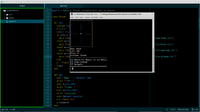LWFlouisa
Still Fresh
- Joined
- May 6, 2018
- Messages
- 15
- Age
- 36
I'm more used to developing in Ruby and HTML, although I'm currently working with Shoes GUI. Gitlab currently wiped all my gits I had stored there, so buh bye Terminal Shooter.
Although luckily I still have the prototype for Doomed Warrior, another 7DRL I did.
I've heard Python is similar to Ruby, although Crystal seems closer to it to me.
I can learn Python, it just might be slower.
In referencing to developing for Pyra specifically. Or should I try Pandora first?
Although luckily I still have the prototype for Doomed Warrior, another 7DRL I did.
I've heard Python is similar to Ruby, although Crystal seems closer to it to me.
I can learn Python, it just might be slower.
In referencing to developing for Pyra specifically. Or should I try Pandora first?


